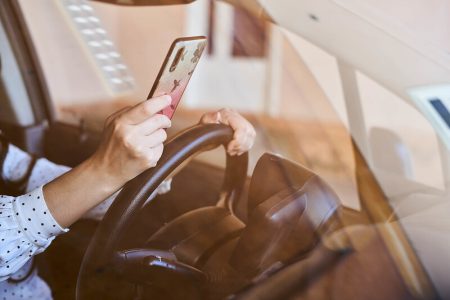Note: GJEL Accident Attorneys regularly sponsors coverage on Streetsblog San Francisco and Streetsblog California. Unless noted in the story, GJEL Accident Attorneys is not consulted for the content or editorial direction of the sponsored content.
The Insurance Institute for Highway Safety (IIHS) released a report today that highlights the uselessness of California's laws on cellphone use while driving. Texting while driving is illegal in most places, but California's law hasn't resulted in a significant drop in crash rates, while in Oregon and Washington, similar laws have made a difference.
The paper discusses possible reasons for this. The researchers conclude that California's law is written in a way that makes it harder to understand and to enforce, and that makes police less willing to write tickets that could be easily dismissed. Another potential reason is that fines and consequences for cellphone infractions are low in California, which may also contribute to a lack of interest in enforcing the law.
California's law is less clear than both Washington's and Oregon's laws about exactly when it is illegal to text while driving. In both of the other states it is illegal to "hold and use" a cellphone even while a car is temporarily stopped, for example at a stop light. Whereas in California, while it's illegal to text on your phone while temporarily stopped, the law specifies only that it is illegal to "use" it. "Holding" it is not explicitly forbidden - thank you for that, cellphone and auto companies. This makes it easier for a driver to argue that they weren't using it. Add to this how hard it is to see what people are actually doing in their cars - thanks, illegal tinted windows everywhere.
In-car distractions have been increasing with little regulation, and cellphones are only one of the many potentially deadly distractions available to drivers. But this finding that clear, enforceable laws are making a difference in nearby states is compelling.
The research focuses on rear-end crashes, since past research has shown that cellphone use is associated with a much larger increase in the odds of rear-end crashes than any other type of crash. In addition, police-reported distracted driving is inconsistently reported and provides less data to work with.
All three states strengthened their cellphone laws in 2017, adding language that required hands-free use of cellphones. Washington experienced a 7.6 percent reduction in monthly rear-end crashes relative to the rates in several control states that did not change their laws (Colorado and Idaho). Monthly rear-end injury crashes were reduced by almost eleven percent in Washington, and close to nine percent in Oregon. California saw no such changes after it changed its law.
The researchers propose that "legislation that comprehensively bans practically all visual-manual cellphone activity may have made the laws easier to enforce and clarified to drivers that handheld cellphone use is unacceptable."
“Technology is moving much faster than the laws,” says Ian Reagan, a senior research scientist at the Insurance Institute for Highway Safety. “One solution may be to make them broader, rather than trying to come up with an exhaustive list of banned behaviors.”
There is also evidence that the laws in Oregon and Washington spurred more enforcement. In those states, the base fines are much higher (for first offenses, $136 in Washington and $265 in Oregon, compared to $20 in California) and they go up fast. In Oregon, a third offense could bring a find of $2,000, a criminal charge, and jail time.
Of course the issue of enforcement is fraught, and California cities have been struggling with how to move away from even using police in traffic enforcement and to decrease bias in enforcement rates. It's not simple.
And distracted driving won't be solved by laws and enforcement alone. Other groups including the Governors Highway Safety Association (GHSA) have studied and reported on distracted driving, showing that underreporting of statistics is muddying the issue and that "social norm" changes are needed. (National safety experts are meeting to discuss this and other safety issues this September in Louisville.)
But this study shows that California's current cellphone laws are not doing much.






